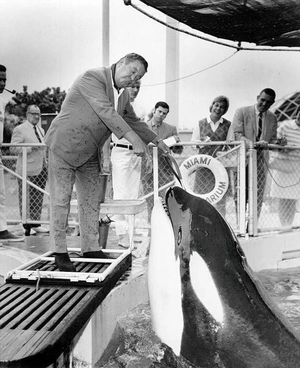Hugo (orca)
Hugo was an orca who was captured from the wild and captive at the Miami Seaquarium.
In February 1968, twelve orcas were captured in Vaughn Bay. A young male was reportedly the only one that was kept. He was held at the Seattle Marine Aquarium before being bought by the Miami Seaquarium where he was housed in a small pool that is now used for housing manatees.
In 1970, a second orca arrived. Her name was Lolita (formerly known as Tokitae) and she was also from the southern resident population. They were kept separate at first but would often call to each other until Hugo was moved to the tank that had been built for Lolita. The two did not seem to get along at first which also resulted in Hugo becoming aggressive towards his trainers.
Eventually, the two whales began to get along. They mated on multiple occasions sometimes even during shows. This supposedly resulted in Lolita becoming pregnant several times, however, she never gave birth to any live offspring.
Hugo also had a history of self-harming behavior that consisted of him slamming himself into tank walls, as well as multiple aggressive acts towards his trainers. He once broke the glass viewing windows, ending up with him cutting off the tip of his rostrum, which was later sewn back on by veterinarian Dr. Jesse White.
On March 4, 1980, Hugo died after slamming himself into a tank wall and suffering a brain aneurysm. Some claimed it to be an act of suicide. His body was then lifted from the tank, and disposed of at the Miami Dade Dump.
See also
External links
- One Dolphin's Story The Dolphin Project
- WHALE OF PAIN Heartbreaking story of killer whale named Hugo who ‘killed himself’ by repeatedly ramming head against tank The Sun
- Killer Whale Commits Suicide (Hugo's Story) YouTube
- Necropsy- Killer Whale Hugo Animal Advocate Hub
- Orca whale killed himself by smashing head into wall after 12 years in captivity The Mirror
- Photo Illustrates the Lesson We Should Have Learned About Orca Captivity in the 1980s One Green Planet
References
- This article is adapted from 160 Captives

